Lawmakers hesitant to support Healey's push for more flexibility for municipal taxes
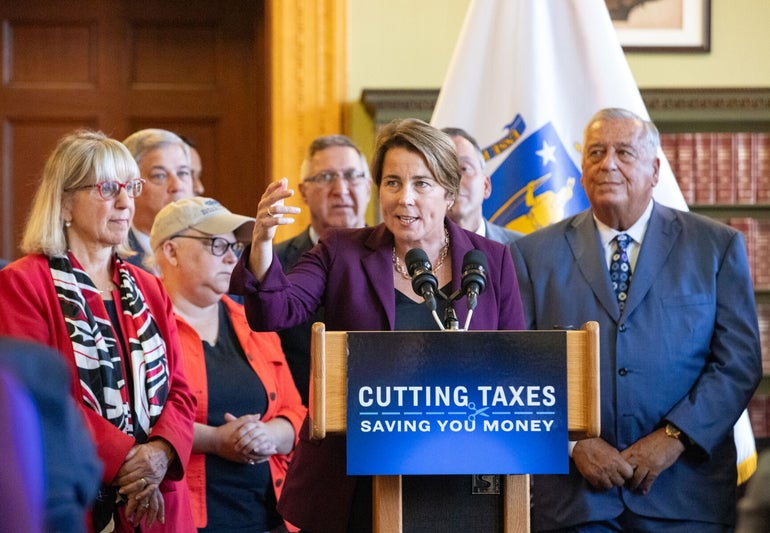 Image | Courtesy of State House News Service
Gov. Maura Healey speaks in the State Library on Wednesday, Oct. 4, 2023 after signing a tax relief bill into law, joined by top lawmakers including (far left) Senate President Karen Spilka and (far right) House Speaker Ronald Mariano.
Image | Courtesy of State House News Service
Gov. Maura Healey speaks in the State Library on Wednesday, Oct. 4, 2023 after signing a tax relief bill into law, joined by top lawmakers including (far left) Senate President Karen Spilka and (far right) House Speaker Ronald Mariano.
Increasing local meals, hotels and vehicle taxes would be a "lifeline" for municipalities struggling to keep up with inflation to pay for services like schools and roads, municipal officials said Thursday, but not all lawmakers immediately jumped on board and a business group argued that increasing taxes will hurt small businesses still recovering from the pandemic.
Gov. Maura Healey's proposal to give communities more flexibility to raise certain taxes was in front of the Joint Committee on Revenue for a hearing Thursday, only about a month after she filed the proposal as part of a broad municipally-focused bill.
The governor's plans to let cities and towns raise local taxes on hotel rooms and restaurant meals surprised some this year, after Healey touted a major tax relief law last year as the landmark accomplishment of her first year in office.
The hearing on Healey's bill also came on the same day that the governor visited an energy storage company in Somerville to pitch her plans for hundreds of millions of dollars in tax credits to help grow the life sciences and climate technology sectors.
Her municipal bill proposes to give cities and towns a number of possible local-option tax changes: increasing the maximum tax on hotels, motels and rentals from 6 percent to 7 percent of the price of a room (and from 6.5 percent to 7.5 percent in Boston), increasing the meals tax from 0.75 percent to 1 percent, and appending an additional 5 percent surcharge on motor vehicle excise taxes.
Healey's proposal carves out a new means-tested property tax exemption for eligible seniors, and municipalities could raise existing senior property tax exemptions. The bill also looks to make some pandemic-era flexibilities permanent, such as outdoor dining and to-go cocktails.
"The revenue generators we're talking about today are not broad-based tax increases to balance the state budget. There are local options that empower cities and towns to make modest adjustments in their local revenue generators, including lodging, meals and motor vehicle excise, that might be the right fit to meet local needs and local economies," Lt. Gov. Kim Driscoll said at the hearing.
The last time the meals tax was raised was in 2009, she said, and not every community opted into it. The administration said increasing the maximum meals tax could generate around $58 million in additional local revenue around the state.
Administration officials said they chose to focus on the hotel tax because it is usually not the residents of a town who pay it. The meals tax, however, would likely be paid by local residents, as would the vehicle excise taxes.
Rep. Francisco Paulino of Methuen expressed concern about the idea of raising any taxes, warning that it could hurt low-income families.
"In Lawrence, 80 to 90 percent of my constituents are low-income," Paulino said. "So we have to make sure that when we try to do something for municipalities, we aren't harming the people that live within those municipalities. So in my point of view, there needs to be a balance. We need to study this deeply."
Executive Director of the Metropolitan Area Planning Council and former representative Marc Draisen, who testified in support of the bill, responded that Paulino's concerns are why the bill is designed for cities and towns to opt-in to policies that work for them.
"Every tax vote is a difficult one," Draisen said. "I'm asking all of you to put enough trust and faith in your local governments to decide whether or not to take one, two, three, or none of these steps."
Lawmakers warned that the current vehicle excise tax was among the most unpopular taxes in the state, and said they were concerned about raising it.
"I think if we polled people in Massachusetts about their most hated tax, it would probably be the automobile excise tax. And probably the biggest complaint that local officials in my district hear about are the conditions of the roads," Rep. David Linsky, who sits on the Revenue Committee, said.
Linsky suggested using the revenue brought in from the new vehicle tax directly on local road and bridge improvements. Driscoll responded that the administration intentionally wrote the bill to give municipalities flexibility to choose how to spend the increased revenue, but Linsky asked his House colleagues to consider the alternative he suggested.
"One of the reasons we thought it was important to incorporate the motor vehicle excise enhancement in this bill was because it was the one enhancement that would benefit all communities," Driscoll said. "Not everyone, as I mentioned, has restaurants or hotels or robust tourism operations. But this would provide a revenue tool for every municipality."
She added that the average motor vehicle excise bill statewide is $154 per year. Therefore, the 5 percent surcharge would cost an average $7.70 per year additional, she said, and provide approximately $48 million across the state if all communities adopted it.
"These are all options. And I can't strongly underscore enough, as brought up by others giving testimony, many communities may not pursue them. But for many of these towns and cities, including Easthampton, it's a lifeline. Especially as we face challenging fiscal tides," Easthampton Mayor Nicole LaChapelle said.
Municipal leaders said the extra revenue could help fill in the gaps for infrastructure projects and better support schools -- which across the state are struggling from teachers shortages, partially due to educators' pay.
Supporters were also enthusiastic about the expansion of senior property tax exemptions as Massachusetts' population ages. A growing number of communities have sought to expand these property tax exemptions in recent years to protect older members of the community on fixed incomes as property values, and therefore taxes, increase.
Christopher Carlozzi, Massachusetts state director for the National Federation of Independent Businesses, was the only person to testify against the bill during Thursday's hearing.
Restaurants and the tourism industry were among the most affected by COVID-19 shutdowns, he said, and are still recovering from the effects of the pandemic that caused a number of businesses to shut down.
"Local government should not provide diners with one more reason not to spend money at a neighborhood restaurant by further increasing the meals tax. Let's not add to Massachusetts' affordability problem," Carlozzi said.
Tourism revenue bounced back and exceeded pre-pandemic levels in 2022, he said, but Carlozzi warned against "jeopardizing tourism" by making Massachusetts a more expensive vacation destination compared to other New England states.
Of the 351 cities and towns in Massachusetts, 216 have opted into the 6 percent local lodging tax, according to the administration. In fiscal 2023, it generated $317 million. If Healey's plan is approved, allowing communities to increase it to 7 percent and Boston to 7.5 percent, it could generate an additional $49 million in additional local revenue.
"We don't want to push [tourists] to lower cash cost options in New Hampshire or Maine when tourism dollars leave our state and impact more than just the lodging industry, but restaurants, amusements, attractions, transportation as well," Carlozzi said. "The commonwealth goes to great lengths and large sums of money to attract vacationers to the Bay State. We must not undermine those efforts by taxing potential vacationers into another state."
He also opposed the vehicle excise tax expansion, arguing that it would hurt both small businesses that need to use vehicles and workers who don't have work-from-home options and must drive to work.






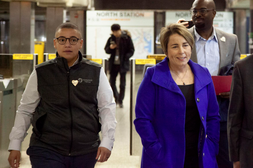
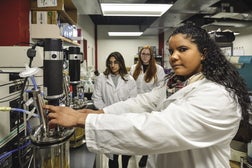
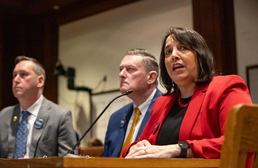
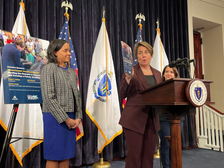



0 Comments